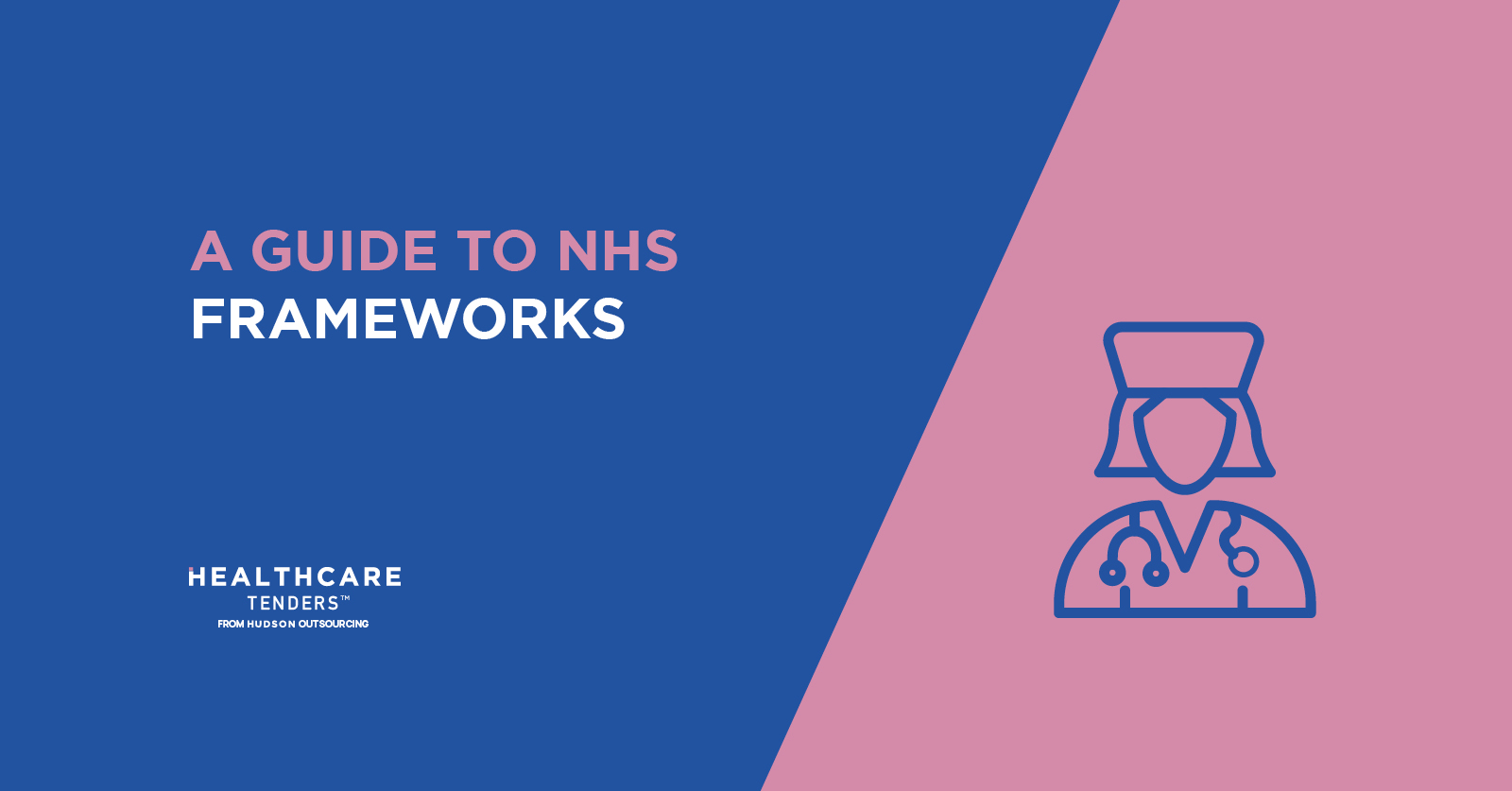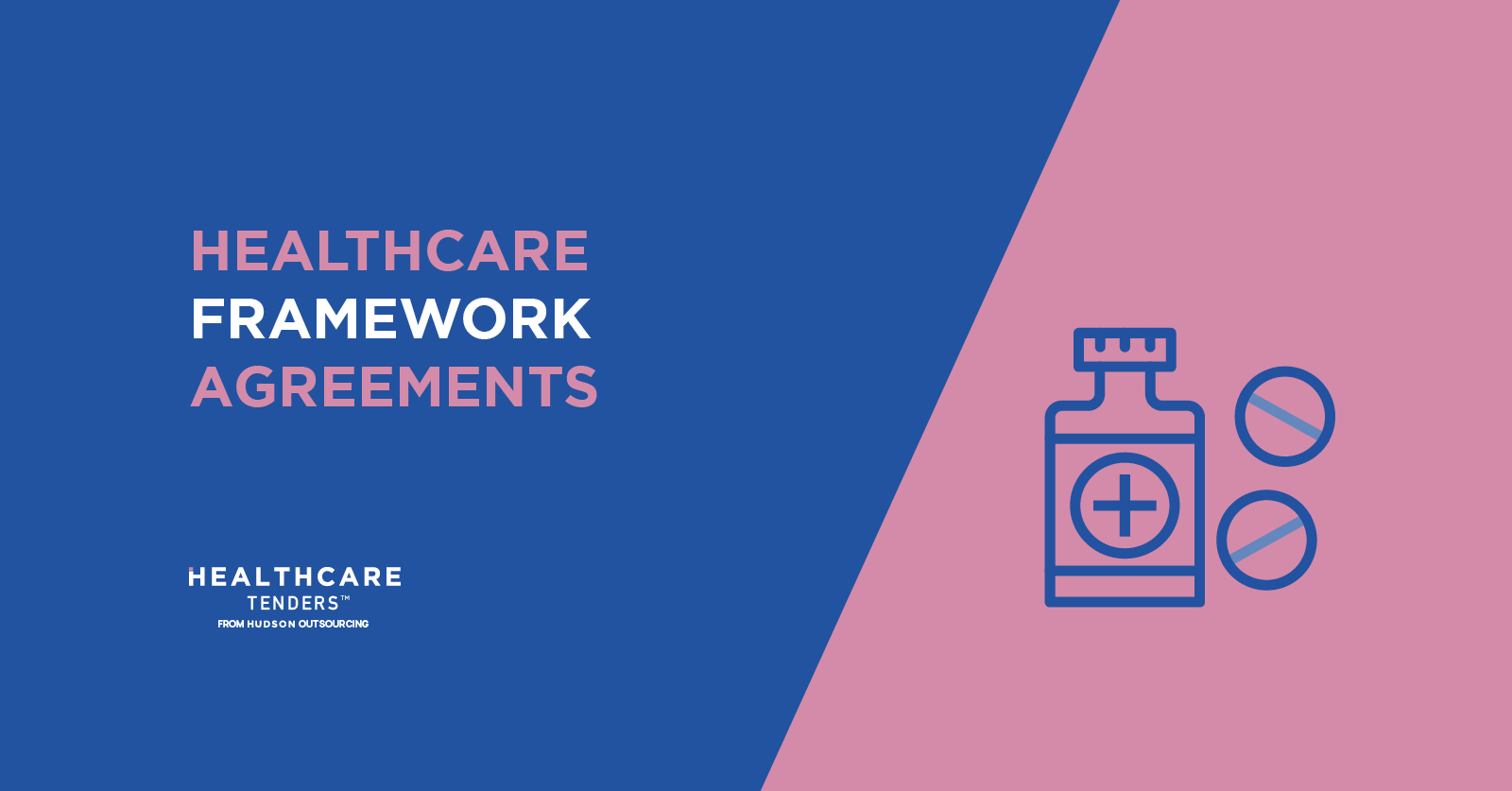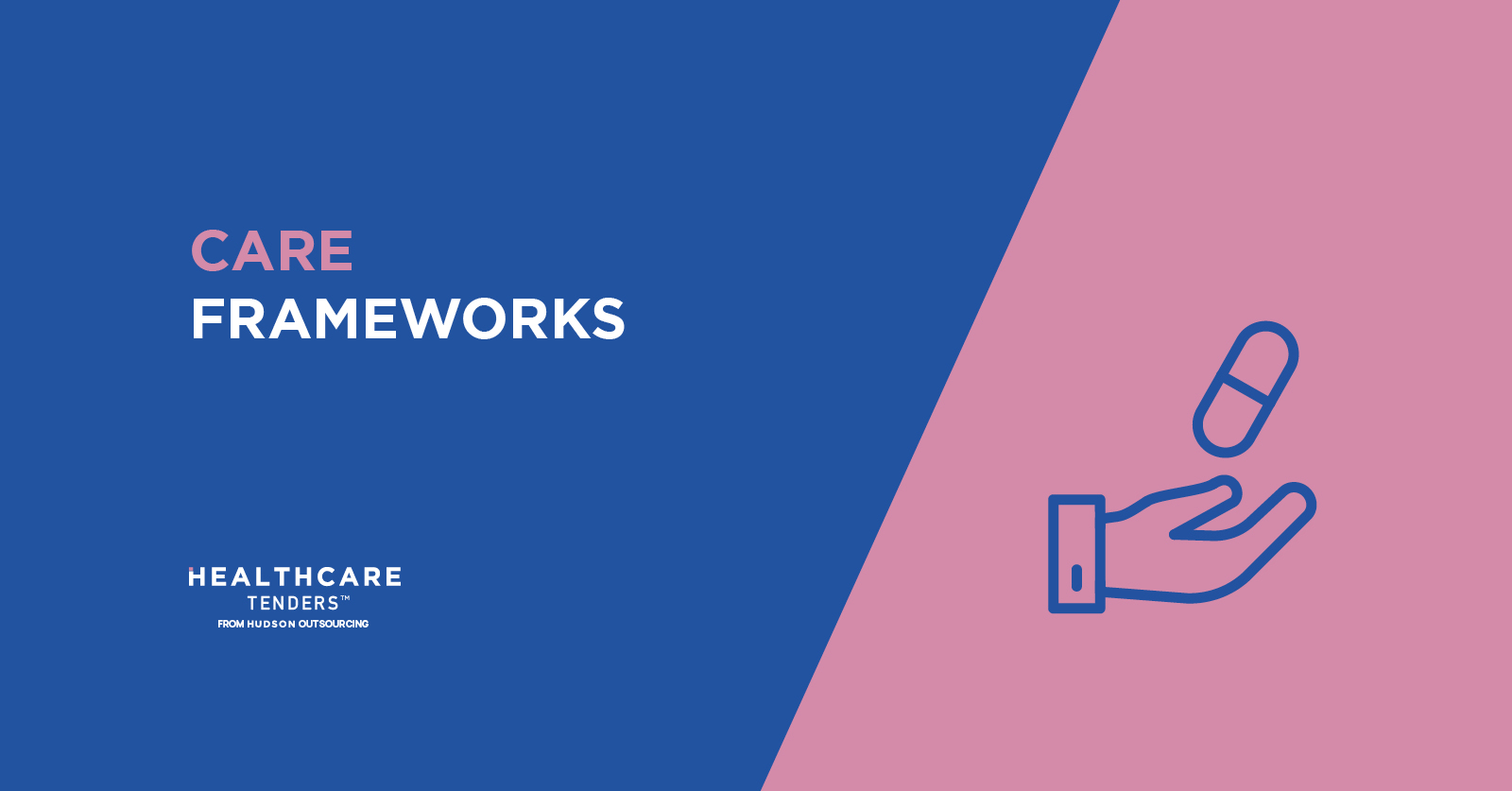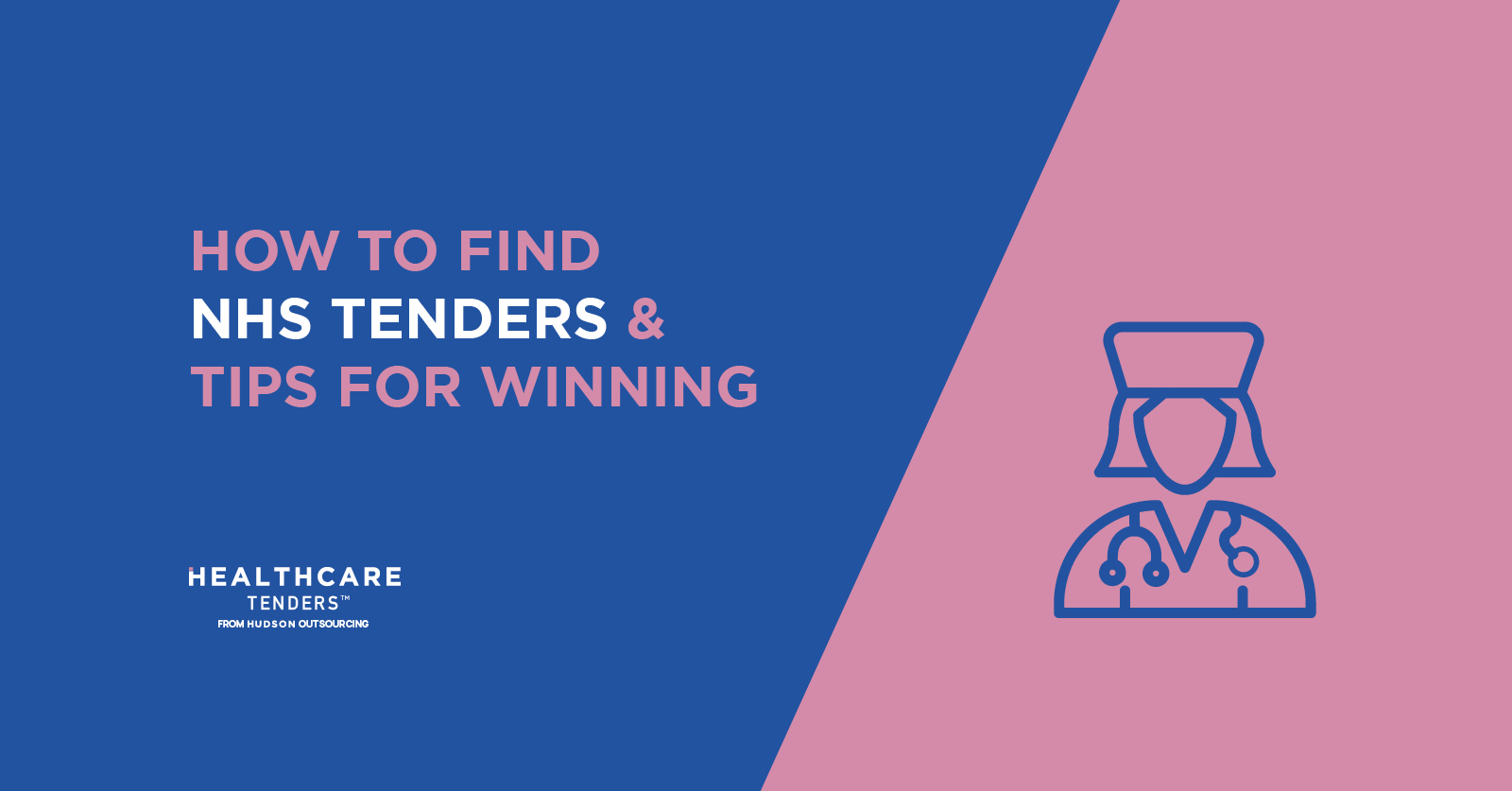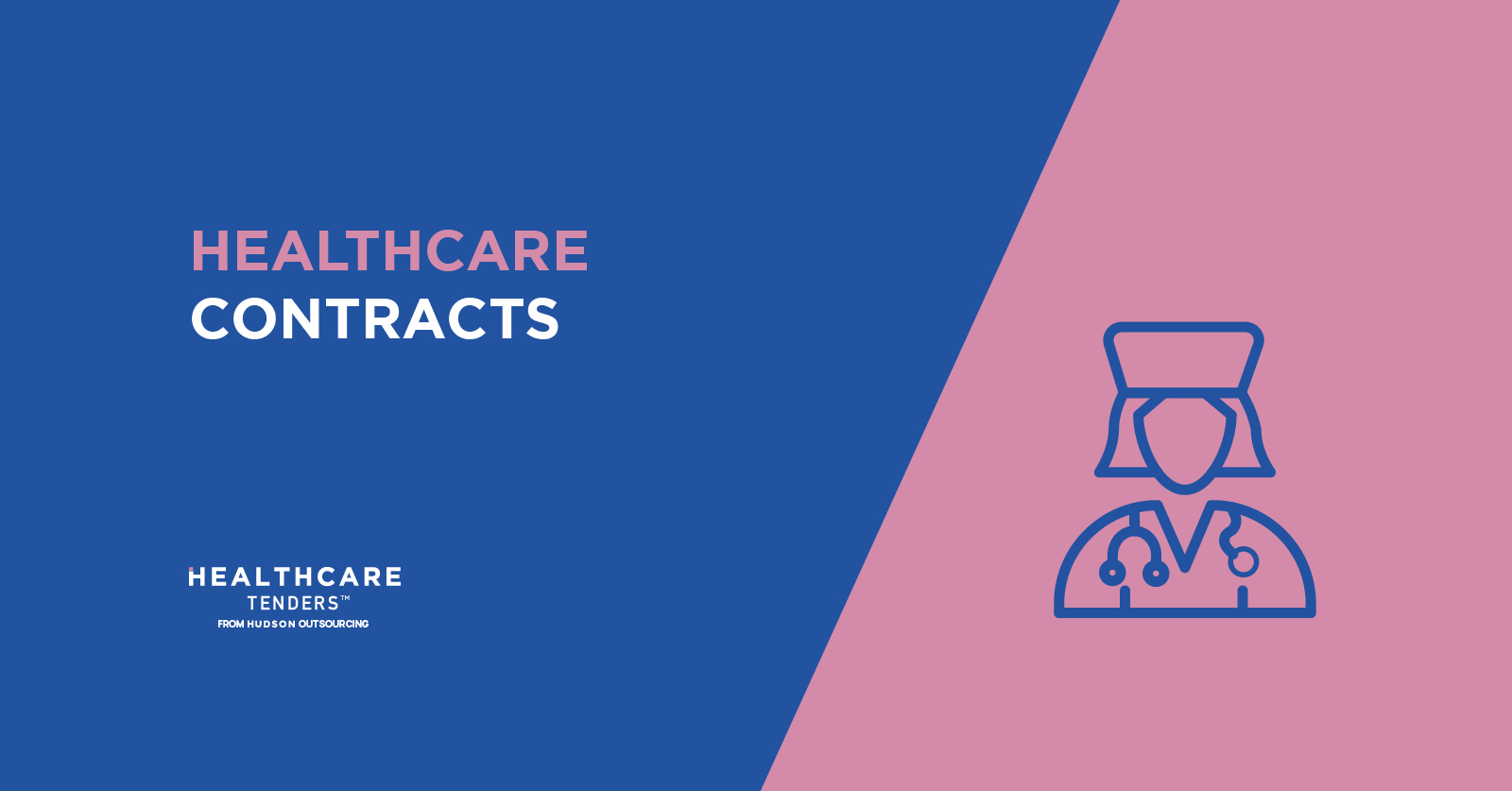NHS Tenders, Frameworks & Contracts
NHS tenders can often seem confusing and overwhelming. As part of the NHS, they account for one of the largest procurement organisations in the UK. In reality, they are very similar to other tenders, with only a few differences. This is your go-to guide for NHS tenders, frameworks and contracts – keep reading to find out all you need to know.
FAQs
Here, we will answer some questions you may have about the NHS tender process and frameworks.
What is a framework?
An NHS framework agreement is a form of tendering contract. Here, the NHS, as the buyer, is seeking a supplier to deliver goods, works or services. While tenders often focus on a single supplier delivering the required product, frameworks aim to establish a multi-supplier agreement. These agreements are often over a longer term of between 2-10 years.
The NHS tendering process is similar to that of an average tendering contract. The buyer will issue a notice for suppliers where they can submit a bid to provide their services. Once these bids have been submitted, the buyer can then review each bid. At this point, the buyer will be able to create a list of approved suppliers. These suppliers will then be awarded a place on the NHS framework agreement.
From here, whenever the buyer has an opportunity or project available, they will have their list of pre-approved suppliers available. Often, there will be a mini competition held to select a preferred supplier from this list. This is a lot simpler than the normal tendering process as most information will be readily available. The award can be based on performance, location, and availability. Alternatively, the buyer may allow for a direct award.
Ultimately, this form of agreement will reduce the amount of time and stress involved in the tendering process.
Are frameworks better than other types of contract?
The amount of work that comes with being a single supplier is guaranteed. However, the amount of experience gained doesn’t differ greatly, rendering frameworks a valuable business growth opportunity.
Why does the NHS use frameworks?
The advantage of frameworks for all buyers is the ability to retain multiple suppliers who can deliver the same or related services. Services required by the NHS are usually very in demand and have a large scope.
It is beneficial to have multiple suppliers on hand to ensure that services can be delivered across all locations.
Larger NHS bodies may release tenders in the form of framework agreements. It is worth noting that work will often be carried out for smaller trusts or hospitals. For example, the NHS London Procurement Partnership could release a domiciliary care framework agreement. Under this agreement, one supplier may only ever deliver work for say, three hospitals, for example.
What kind of experience should I have?
You don’t necessarily need experience with other frameworks to apply. What’s important is experience relevant to the stipulated provision. This could be:
- The same services delivered for a different type of client to the NHS:
- Any services delivered for the NHS or a similar client
- The same services delivered for the NHS or a similar client.
Detailing your experience carries a lot of weight, especially for NHS-related procurement. It will be important to carefully consider whether your experience is relevant. Even more important will be tailoring it to the requirements of the framework specification.
Am I guaranteed work if I’m successful?
Not necessarily. It depends on the format of the framework. Some frameworks may award work to all successful suppliers, whereas some may undergo mini competitions.
A mini competition is another evaluation stage. It’s essentially about each supplier proving they can deliver the services required. The best supplier(s) will be awarded the work after each mini competition.
What are the advantages of being a supplier on NHS frameworks?
As we have already established, there are many advantages to using NHS frameworks to secure work. However, the benefits are limitless.
Here is a breakdown of the top five advantages of securing work via framework agreements:
-
They are an easier way for small and medium enterprises (SMEs) to secure work
When you start tendering for work, the whole process can feel daunting. Many buyers require contract examples and prior experience. As an SME, you may feel as though your business won’t stand out from the crowd. You could have the capabilities; however, a bigger or more established organisation may pip you to the post. NHS frameworks offer the perfect solution to this. As multiple suppliers can be admitted onto the agreement, you will not be competing in the same way. Similarly, the more suppliers the framework allows, the better your chances are of securing a place on the agreement.
-
Long term revenue
On average, a framework agreement lasts for four years. NHS frameworks tend to follow a structured process where estimated values are clear. By combining these two factors, framework agreements can provide businesses with structured, long term, revenue. Having this financial stability can make all the difference when planning for the future of your business.
-
Accepting work that is convenient for your business
Similarly, these long-term agreements can help when building your pipeline of work. It is extremely important to know when you finish one project, your organisation has another lined up. With framework agreements, you know you have potential work waiting for you. As well as that, you are under no obligation to accept work that arises as part of the framework agreement. You ultimately have the freedom to accept the work which is more convenient for your business.
-
Building professional relationships
An NHS framework is a fantastic opportunity to work with public sector industries. Once you have been approved by the sector, you can gain opportunities to secure more public sector work. You may be asked to extend your contract or given a reference for a more competitive project. Having these contract examples under your belt is also crucial to obtain contracts when tendering for work. These business relationships can last for the duration of your career and open a lot of doors for your organisation.
-
Saving time and effort
Tendering can often involve a long and rigorous process. It can feel never-ending when submitting multiple bids for opportunities. However, with framework agreements, you can save a lot of time and energy and still get a few contracts under your belt. Once you have been accepted onto a framework, you will be on a pre-approved supplier list. This means when an opportunity arises the process will be a lot shorter. Ultimately, NHS frameworks are an extremely efficient way to secure work.
What are the usual methods for supplying to the NHS?
The method of supplying to the NHS often begins with a potential supplier needing to complete a pre-qualification questionnaire (PQQ). This initial stage could also go by the name of a selection questionnaire, known as an SQ. These stages assess and ensure a potential supplier meets the minimum eligibility requirements. Usually, they are a box-ticking exercise. They will often require you to note:
- Company information
- Diversity, equality and environmental policies
- Grounds for mandatory exclusion
- Subcontractor information
- Economic and financial standing.
Once a supplier has passed this stage, they will then be given an invitation to tender (ITT). A hopeful supplier will then answer the specification and submit a tender response. Their response should aim to convince the buyer that they are the best business for the contract.
If successful, they will then be awarded either the tender, a place on the framework or DPS. Fortunately, once they’ve secured a place, suppliers won’t have to do a PQQ or SQ again when an ITT is released.
Who commissions NHS frameworks?
NHS framework agreements, alongside other procurement methods, are primarily commissioned by clinical commissioning groups (CCGs). These groups replaced Primary Care Trusts in 2013. They are locally based and clinically-led NHS bodies who are responsible for procurement and commissioning within their area.
CCGs are involved with assessing the needs within the area and making plans/decisions based on these needs. CCGs must constantly review these needs due to local circumstances changing rapidly. As they are responsible for the wellbeing within the local area, solutions must be constantly improved. This ultimately results in a substantial amount of new NHS framework opportunities arising.
In relation to the changing needs of communities, and how commissioning can impact this, the NHS Clinical Commissioners stated:
The commissioning system is continually evolving. We represent our members’ views in national debates on the future of commissioning by producing policy briefings and influencing documents.
One of our early influencing documents was Local solutions to national challenges (2015), which put forward a series of key “asks” to give clinical commissioners the freedoms and flexibilities they need to make even more of a difference in transforming healthcare locally.
Our publication The future of commissioning (2016) set out our vision for the future of clinical commissioning, based on feedback from our members.
More recently, Steering towards strategic commissioning (2017) outlines what CCGs need to support their strategic commissioning ambitions and get there at pace.
We followed up our 2017 publication with a joint publication with NHS Providers, Driving forward system working (2018), which examined the changing relationship between commissioners and providers in the context of system working.
Is my business eligible to work with the NHS?
As the United Kingdom’s primary healthcare provider, the NHS can be quite an intimidating buyer, particularly for SMEs. A common assumption is that the NHS can only work with larger, more established organisations. However, this is certainly not the case. NHS commissioners actively seek suppliers who span across a range of levels and offerings.
The NHS is a publicly funded healthcare system for the United Kingdom. This means the NHS must comply with the public sector regulations. When using public money for purchasing, contracting authorities must be fair and transparent. The UK government currently has a target to spend £1 in every £3 with SMEs to support these growing businesses.
John Allan, National Chairman for the Federation of Small Businesses (FSB), said:
“The government has much to gain from opening up public procurement to smaller businesses and we welcome the government’s commitment to achieve this ambitious target. To meet it, the government will need to focus on robust monitoring and challenge of poor practices wherever they are found. The FSB will play its part, and will work with ministers on this important goal.”
How can spot provider frameworks help me grow if I’m an SME?
If you’re a relatively new business, spot provider frameworks are a great way to help your company grow. This is because securing a place can guarantee income, secure a pipeline of work and enable you to gain experience. Tenders will more often than not require you to demonstrate your capabilities via case studies. Up to three case studies can be required within the last five years.
These case studies should be previous contracts your business has fulfilled similar in scope, scale and complexity. Spot frameworks can help you gain more experience and build case studies. The more experience you have, the bigger contracts you can go for. The bigger contracts you go for as a business, the more income you’ll get – the bigger your business will grow. These are just a couple of advantages of tendering.
How do I find NHS frameworks?
NHS procurement occurs on a variety of portals. You can discover healthcare leads through either scouring the relevant portals/contract notice sites or through Hudson Discover’s Healthcare Tenders (more below). Once you have seen a framework that takes your fancy, register your interest.
This is important as some portals have expression of interest deadlines. You need to register in order to participate in the procurement. Registering interest doesn’t commit you to submitting a response either, but it may provide you with the tender documents so you can assess the requirements.
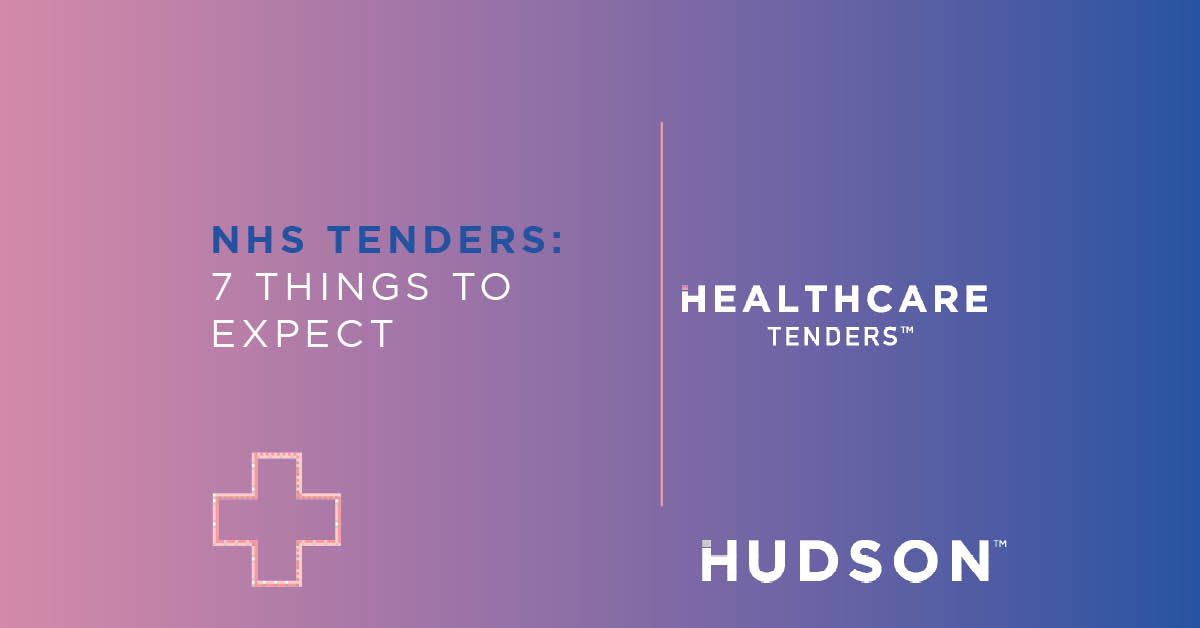
Expectations for NHS Tenders & Frameworks
Here, we will detail what you can expect to see from an NHS framework as a supplier.
A detailed specification
With most NHS frameworks, an extensive specification will form part of the tender documentation. This specification will contain information about service delivery requirements and expectations. Notably, it will also most likely contain references to specific NHS procedures and policies to which suppliers should adhere.
The specification will shape and inform your answers. It is imperative that this is evidenced, showing how you will fulfil and even exceed the requirements that are mentioned in the specification.
A pricing schedule
Like any tender, NHS frameworks will include a pricing schedule. We know that currently, the NHS is underfunded and under pressure. The most economically advantageous tenders (MEATs) will be usually be awarded places on frameworks. The NHS will always be looking for services to be competitively priced and it is worth spending time on this aspect of your response. Consider how you can offer the best value without operating at a loss. Researching into the average prices for your services is a good way of determining what you charge.
An emphasis on safeguarding and training
It almost goes without saying that NHS premises require a high degree of safeguarding. In NHS frameworks, there are often questions asking about safeguarding practices. Vulnerable and/or young patients are housed in or frequent the premises. You should be able to demonstrate that you will protect the welfare of NHS service users when carrying out the required services. Ultimately having a safeguarding policy is vital.
Similarly, training will be essential to successfully delivering services required by the NHS. As we have already discussed, the NHS have specific and high standards. These cannot be achieved without competent and qualified staff. In your responses, you will probably be asked to demonstrate how you ensure that your staff’s training:
- Remains up to date
- Is delivered by an appropriate individual
- Aligns with the specification and NHS standards/guidelines
- Continually informs their work.
To demonstrate your quality assurance processes
As you can imagine, the NHS is strained at the best of times. NHS Procurement Teams will want to know that you can do the job correctly first-time round. Having a written quality assurance system is essential to achieving this.
Quality questions will seek to gauge your quality assurance abilities. Keep these structured, realistic and in line with the specification to ensure you are meeting requirements.
Compliance adjustments
The NHS has many written policies and procedures in place. You name it, they’ve probably got it. As such a large body, they need to ensure that standards are high and that practices are watertight across the country.
It may be the case that policies need attaching as evidence. You may have to amend these policies slightly to reflect the expectations outlined in those of the NHS. This could entail adding a clause or a stage in a process or changing specified timescales.
Although a fiddly process, including combing through NHS documents, this is important to ensure your compliance. Suppliers who are not compliant won’t stand in good stead to deliver the required services.
A lengthy procurement process
NHS frameworks are often large and complicated. In our experience, clarification questions can rocket into the hundreds and evaluation is no piece of cake for the Procurement Team. It’s far easier to evaluate a single-supplier contract – you may need patience when waiting for results of NHS frameworks.
Keep an eye out for amended documents. If there are numerous clarification questions about the same clause, the procurement teams may need to make changes. Some amendments will significantly affect the quality responses and/or the pricing. Stay on the ball and don’t ignore portal notifications.
HealthTrust Europe
HealthTrust Europe (HTE) is owned and operated by HCA Healthcare. This organisation partners with the NHS to improve healthcare performance and supplies services to the public sector. It has a framework agreement in place with the University Hospitals Coventry and Warwickshire NHS Trust. This means that HTE procures and supplies services on behalf of this NHS Trust.
Although HTE is a private sector body, it may release public sector frameworks on behalf of the NHS. If you see an HTE framework, this may be another way to deliver services for the NHS under a framework agreement.
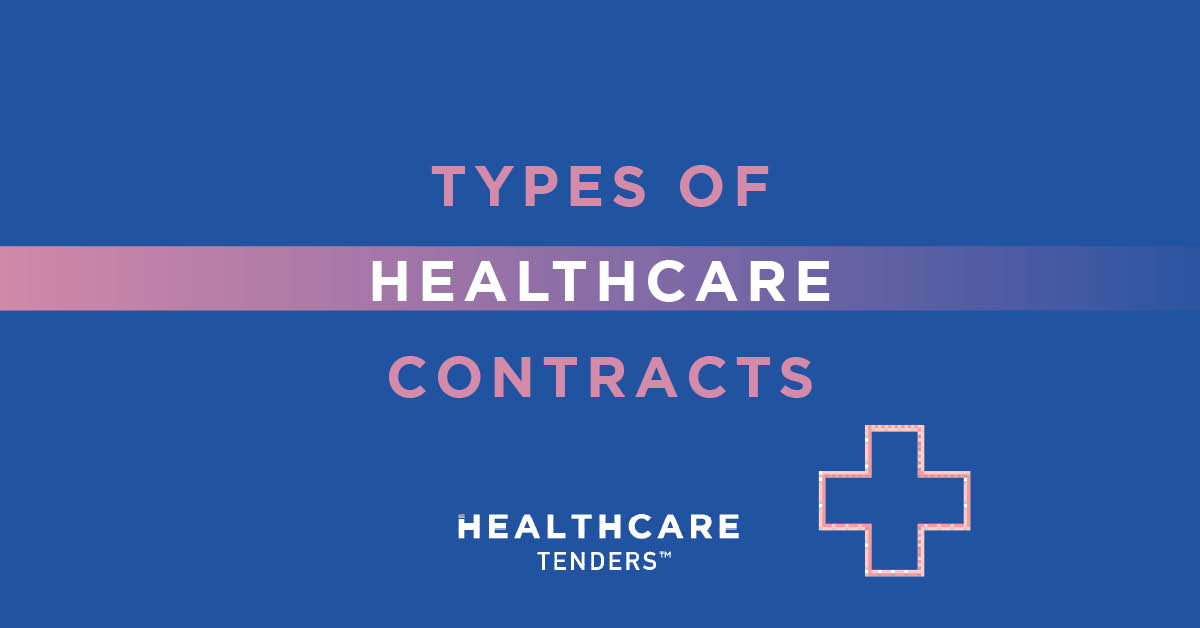
Types of Healthcare Contracts
Britain’s NHS Trusts spend approximately £9 billion a year procuring goods and services. The healthcare sector in the UK could not run efficiently without private sector suppliers.
As a result, our Healthcare Tenders portal sees a constant stream of healthcare contract opportunities, concerning a variety of disciplines, crop up all across the UK.
An estimated 1 in 3 NHS clinical services tenders are won by private sector contractors.
The NHS is always looking for innovative new partners and they regularly award contracts worth many thousands of pounds to the successful bidders. Types of Healthcare contracts readily available via the public procurement process route include:
As the lifespan of the average UK resident continues to grow, as does the need for domiciliary care. Over recent years the issuing of domiciliary care tenders has risen drastically.
The personal care of the elderly and the disadvantaged and vulnerable is consistently and continuously being outsourced to private organisations. Providing opportunities to care providers of all statures – from small start-ups to large agencies.
Supported living tenders are extremely varied, from the budget, to scope, to types of the service user; so, you can be sure that there is one that is right for your business.
There are a variety of tenders tailored to the provision of supported living for specific service users. Including, those with learning disabilities, young offenders and asylum seekers.
These demographic groups are typically split into lots within the tender documentation. Enabling your organisation to tender to support the demographic that your organisation specialises in.
Contract notices will, more often than not, appear in the forms of frameworks or DPS registers.
This is because a council (for example) needs multiple providers to be able to look after all service users in their designated area. DPS registers are active for several years, and if you are unsuccessful, you can reapply. Frameworks have set deadlines, like single-supplier contracts, but multiple suppliers will be successful.
The scope for contracts in this area is vast. Opportunities can include; provision of hygiene supplies, maintenance of specialist surgical equipment and the supply of first aid equipment.
At the moment, the provision of face masks and PPE is in particularly high demand from buyers. This is due to the recent COVID-19 global pandemic to ensure that front-line staff are protected from infection.
All Medical Equipment Tenders within the public sector are highly regulated. This is because the equipment provided must meet strict and rigorous standards.
These tenders will mainly appear in the forms of a framework agreement or a DPS register. These enable authorities to award contracts to multiple suppliers; those who rank in the top proportion of applicants or pass a certain benchmark.
There is a wide variety of care provision tenders available to organisations of all sizes. Buying authorities are continuously contracting the provision of social care, mental health and first aid services, to name a few.
How to secure healthcare contracts
Increasingly in the sector, works are being contracted in the form of a greater number of smaller contracts, typically handled by local authorities.
Hence, this provides small, even start-up health and social support providers with a golden opportunity to secure healthcare contracts of all varieties. Based on our experience’s, we have found the main influences on success in tendering for healthcare contracts are:
Past experience
As is a common theme in the process of tendering for work, your evidence is key. Contracting authorities want to see solid evidence of your experience and competency.
It is especially important to show this regarding the challenges you might face on the contract for which you are bidding. Without firm evidence, including numbers, dates, figures and details of specific challenges, you may struggle.
Indeed, building up a bank of case studies to draw on, is a key first step toward winning healthcare tenders.
However, to counteract a lack of organisational experience, we do have spot provider frameworks, which are more geared to the smaller agencies or individuals who deliver healthcare services on a lower-tier delivery basis.
Accreditations and qualifications
To win healthcare contracts, or to be in with a realistic chance thereof, you have to be able to display appropriate accreditations and qualifications. Otherwise, you will fall at the first hurdle. Tendering authorities need to know that you’re a safe bet.
They need to know that you and your team are a safety-competent and respectful pair of hands. Displaying some basic, internationally recognised qualifications, quality accreditations and information security standards for your organisation will help.
Accreditations such as ISO 9001 and ISO 27001, as well as appropriate NVQs (usually level 3 or above), will typically help you make the first cut in the evaluation procedure. This is desirable but not always essential.
CQC registration
When going in for NHS tenders and contracts, having certain accreditations will be beneficial. It could put your application ahead of others, but could also be a requirement for some bid proposals.
If you plan on tendering for NHS tenders and contracts, then we would recommend getting CQC registered.
What is a CQC registration?
Care Quality Commission (CQC) is the regulation of primary care amongst healthcare services. What this means is that providers of healthcare services must meet essential standards of quality. It also means that the safety and dignity of patients who are receiving these services is respected at all times. Being CQC registered demonstrates that you follow the above criteria, and that you are providing exceptional services.
For medical equipment, PPE and medical facilities, being CQC registered means that you also meet the essential standards of quality. This refers to cleanliness, that it is suitable for the intended purpose, and that it is maintained and stored correctly.
Quality responses
Quality is almost always the most pressing aspect of any healthcare contracts. Pricing is typically of secondary consideration to most tendering authorities within this sector.
At our sister business, Hudson Succeed, we submit bids on behalf of healthcare providers, which are judged on 100% quality. Meaning price is often not even considered! Tendering authorities are more interested in getting a good quality service that meets the needs of service users fully, rather than a cheap service.
Providing additional evidence as part of your submission will back up your quality responses. For example, providing policies and/or risk assessments, among other items, will inspire further confidence in your organisation’s ability to provide a safe, quality service.
Corporate Social Responsibility
Social value is becoming more and more prevalent in all tenders, across all business sectors. Buyers want to see you demonstrate how you will bring value to their communities. Typically, this value can be brought through commitments to environmental, social and economic initiatives.
Authorities tendering healthcare contracts don’t just want to see your organisation’s commitment to your service users.
They also want to see your commitment to the wider picture. Nowadays, it is very likely that you will encounter at least one question about social value or community benefits.
A strong social value response can be the difference between a strong care tender and a weak one. Some of the issues that might be presented is your response to
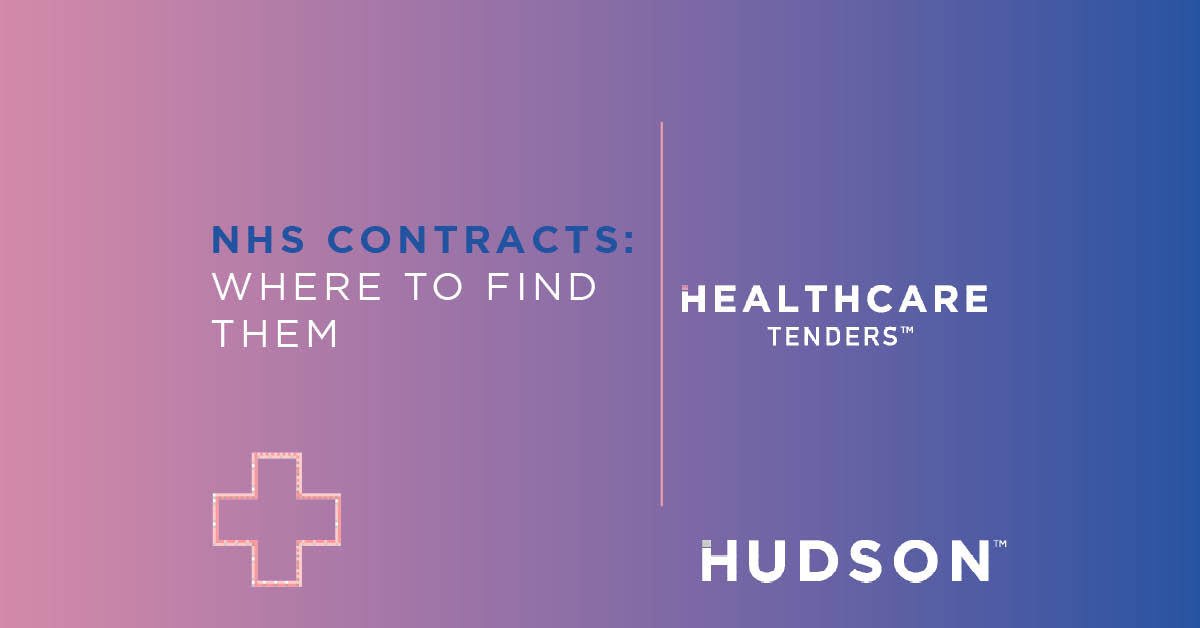
NHS contracts for tender and where to find them
NHS contracts for tender can seem daunting if you’re unfamiliar with the process. Public sector tendering in general can be a bit of a minefield and you’re bound to have plenty of questions. Notoriously, securing NHS contracts can be a rather lengthy and arduous procurement process. However, there is a constant and steady stream of NHS contracts for tender being released.
What type of NHS contracts for tender are there?
The NHS procures many goods, works and services via a range of different tendering procedures. NHS tenders are very diverse. They could range from the maintenance of lifts with their hospitals to the procurement of beds for patients.
The Department for Health and Social Care (DHSC), Public Health England and NHS England are responsible for NHS procurement. Various streams within the NHS and government commission NHS contracts for tender. These include:
- Local Clinical Commissioning Groups
- The Crown Commercial Service
- The NHS Supply Chain.
The NHS uses various NHS procurement hubs in order to buy whatever they need. Largely speaking this is done via framework agreements and Dynamic Purchasing Systems (DPS’).
How are NHS contracts for tender awarded?
NHS contracts for tender are awarded to the most economically advantageous tender, known as the MEAT. The MEAT does not mean that the cheapest bid wins. Buyers are looking at more than just price. Other aspects that they could be considered independently or in combinations are:
- Accessibility
- Patient quality, care and safeguarding
- Health and safety
- Risk management
- Equality, diversity and environmental policies
- Ability to deliver on time.
Does my written response for an NHS contract matter?
In short, yes. Buyers care about the quality of your writing and NHS contracts are no exception. Overall weightings can vary, and your response is split between price and quality. Obviously, you want to score as highly as possible for both. In order to do this for your quality response, it’s not exactly ground-breaking that the quality of your writing matters.
A few things to consider when writing your response to NHS contracts for tender are:
- Focus on being persuasive. Why are you the best business for the job?
- Be as clear and concise as possible while hitting as close to the word or page count as possible.
- Have attention to detail, but don’t be overly descriptive.
- Don’t allow room for the buyers to make assumptions. This could risk allowing the buyer to make the wrong assumption.
Our top 8 tips for winning an NHS Tender
-
Great time management
Having great time management is essential to winning any tender. As mentioned, the NHS tender process can be a lengthy one, so it’s best to be prepared. Ensuring you have enough time to write, proof and submit a winning response should not be underestimated. Set yourself realistic time constraints and internal deadlines for you and your team. Set meetings periodically to check on the progress of everyone involved. Plan accordingly allowing some leeway in case any unexpected delays crop up. This could materialise as technical faults, such as your system crashing just as you submit your bid. No buyer will consider a late submission, no matter the quality so keeping on top of your tasks is essential.
2. Ask clarification questions
Contacting the buyer is essential to refining your proposal, and clarification questions are an integral part of this. Clarification questions should be asked sooner rather than later. The deadline for them is often a lot shorter than submission. Before you ask your question, make sure you have read all of the others. There’s a good chance someone might have already asked the question you’re wanting to. Make sure your question is clear and remember to keep it anonymous – your competitors can see.
3. Researching the winners
An idea for understanding what the buyer wants is looking into past winners of the tenders. What impressed the buyer about them? What did they do that was different from the competition? The more you know about that, the stronger your tender will be.
4. Be the MEAT
Public sector organisations always award contracts to the most economically advantageous tender, known as the MEAT. With a MEAT, the buyer is looking at more than just price. They want to achieve the most value for money. In order to do this, they look at a combination of factors. These could include, but aren’t limited to, the following:
- Patient care
- Accessibility
- Innovation
- Sustainability
- Ability to deliver on time
- Customer service
- Technical ability
5. Produce high quality content
Buyers care about the quality of your writing, even if the weighing is less than cost. It’s advised to try and meet the word or page counts as much as possible. Your answers should be clear and concise, persuasive and not overly descriptive. A pitfall that some bid writers fall through is sending irrelevant information. This can confuse and irritate the buyer, which are two things you never want.
6. The balance between jargon and layman’s terms
Assuming the buyer will know every piece of jargon that you present in your proposal can be fatal for your chances of winning the contract. Due to this, finding the balance between field-specific and layman’s terms will help broaden your audience.
7. Proofread your response before you submit
Proofreading your NHS tender response before you submit can help you avoid silly mistakes. A fresh pair of eyes is a good idea and can help catch any errors. You should double-check that your response is in line with the specification before you submit it. Does it answer the buyer’s question? Get a colleague to look it over, or perhaps if the contract is worth enough, get your proofreading outsourced. This will ensure that any grammatical errors are taken care of. If you think about it, the more proofreads/reviews you have, the higher quality your proposal will become.
8. Make sure you fit the supplier code of conduct
The NHS supplier code of conduct makes sure that whoever is applying for tenders is following certain practices. These essentially help refine the list of the best candidates. These can include
- Adherence to child labour laws
- Fair labour policy
- Equal opportunities and discrimination policy
- Health & safety policy
- Environmental policy
The NHS will check whether you are following this.
9. Monitoring systems
If you’re providing a service, the NHS to see an improvement in what’s offered. Due to this, providing methods of monitoring is important. They can then be reassured during the delivery of your service.
10. Relevant case studies
When applying for NHS tenders, having the right case studies is imperative. The closer the study to your tender, the better. Ultimately the buyer wants to see highly relevant case studies that showcase your suitability for the contract. This remains the same for testimonials, as without the right ones the buyer won’t be convinced of your experience.
11. Bid library
Having a bid library can help shorten your writing times and improve your content. This doesn’t mean copying and pasting content from previous bids, but rather naturally implementing previous content. Ultimately, having a bid library will free your time up for carrying on with other tasks.
Looking for NHS tenders and contracts?
Looking for NHS tenders and contracts to bid for? Then establishing your sector within the healthcare industry is the first step. The healthcare industry is huge. Therefore, the NHS tenders and contracts can vary across multiple services. For example, a care home provider could issue a tender for the supply of medical equipment for their facilities.
The first starting point for you is to look at the healthcare industry and establish where you fit in.
The 7 most common types of NHS tenders and contracts
When looking for NHS tenders and contracts to bid on, these are the most common services that you’ll find:
If you know you provide an exceptional service in a particular sector, then tendering within this field will be beneficial. It can be a good way to develop your business and make yourself known amongst the buyers within the industry. However, this doesn’t mean you can’t go for other tenders in other sectors. You may actually find that your services or products can crossover the different healthcare subsectors. This gives you more opportunities when looking for NHS tenders and contracts. So, even though staying within a sector that is your strong suite is good for business, don’t underestimate other opportunities.
Examples of NHS tenders and contracts
Here are some examples of NHS tenders and contracts sourced for the above services. These are the types of opportunities you will find on Healthcare Tenders.
Domiciliary care:
Domiciliary Care Package
Durham County Council – North East – Budget: Undisclosed
Supported living:
NUN – Homelessness Support Services Contract
Nuneaton & Bedworth Borough Council – West Midlands – Budget: Undisclosed
Mental health services:
B&H VCSE Strategic Partner & Mental Health Network
NHS Brighton & Hove CCG – South East – Budget: Undisclosed
Medical equipment & PPE:
Supply of Large Therapy & Sensory Equipment
Orchard Hill College & Academy Trust – London – £100k
First aid services:
First Aid Training
North Somerset Council – South West – Budget: Undisclosed
Dental services:
Provision of Specialist Orthodontic Services
NHS Wales Shared Services Partnership-Procurement Services – Wales – Budget: Undisclosed
How to get NHS contracts
If you read our previous section on how to win NHS contracts, you’ll know a little about what it takes. Perhaps you’re worried you do not have the time to dedicate to writing a winning NHS contract bid. Maybe you understand that you don’t have all the necessary skills. The good news is that there is plenty of support available!
Who can help you when looking for how to get NHS contracts?
When you’re looking for how to get NHS contracts, you might wonder who can help you. After all, a helping hand is always a benefit. Tender writing experts are always available to offer you the support you need. Whether it is handling the process for you or offering some mentorship along the way. There are plenty of benefits to turning to the experts for help. Here are a few of the benefits of turning to professional Bid Writers when wondering how to get NHS contracts.
Saving time and resources
Perhaps the biggest benefit of bid writing support is that it saves you a lot of time and resources. When you rely on experts, they can handle the entire tendering process for you. They’ll ask to know as much about your business as possible to begin with. Then, you can sit back and relax. Your Bid Writing Consultant will produce a bid of impeccable quality. This also massively increases your chances of success. We will get to that in our second point!
Many businesses may think hiring their own inhouse Bid Writer is best. This is actually a lot less cost effective. You’ll have to go through a lengthy hiring process first. If you aren’t going to be using this Bid Writer consistently, then you’ll be paying more than you need to. When you contact a bid writing company, you’ll instantly be able to get to work with them. Plus, the payment will cover the specific bid you want to complete.
Whilst your Bid Writer completes the bid, you can continue your usual responsibilities. This means there is no excess stress and cramming work into a limited number of hours.
Increased chances of success
As you may imagine, bid writing professionals increase your chances of success. They are experts at what they do. So, if you are wondering how to get NHS contracts, then you should certainly consider this.
You can also find Bid Writers that are specialists in healthcare and NHS contracts. This means they know exactly what it takes when it comes to how to get NHS contracts.
Due to their experience, they’ll know which mistakes to avoid. Someone with little to no experience with bidding could easily make minor errors that could cost them the contract.
A smooth management process
As we touched on, working with a Bid Writer takes a lot of the stress out of the process. This is because they are experts at bid management. Going out to tender can be a hectic process due to the amount of work involved. Bid Writers have an established plan in place to ensure that the project runs smoothly.
They understand how to break down the workload most efficiently and have it completed before the deadline. If you miss the deadline, even by a minute, you won’t be considered for the contract. So, bid management is essential for making sure you stay on track.
Need support?
Writing isn’t everyone’s strong suit, and that’s ok. If you have found NHS contracts for tender but don’t have time, our sister company, Hudson Succeed, can help. They boast an 87% success rate and have over 60 years of bidding experience collectively.
We offer four bid writing packages to suit every tendering need.
How can a Bid Writer help you win NHS tenders and contracts?
As we mentioned above, we have four bid writing packages that can help you with your bid proposals. But what is a Bid Writer and how can they help you?
A Bid Writer is someone who will support you with the writing of your bid proposals. They can be as heavily involved in the process as you like, from start to finish.
They will take the tender documents that are released by the buyer and analyse them in full. This is so that they can fully understand what they need to say in order to meet the set requirements. At this stage, a Bid Writer will also note any specific points they need to be aware off. This will usually be important deadline dates and times. From this, they can begin to plan the work. Mapping out what needs to be done in order to submit the proposals on time and of the highest quality.
After carefully planning the work, the Bid Writer will then begin writing the proposal. They will liaise with you, the client, to get accurate business information for the submission. This will be detailed information required by the buyer. The Bid Writer will be checking that you have all relevant accreditations, policies and procedures in place. Ensuring you have relevant case studies that can be used, and anything else needed to support the proposal.
By going through the bid documents and analysing them, a Bid Writer can help breakdown the proposal for you. This will give you a better understanding about the bid. Allowing you to fully evaluate whether this NHS tender is right for you. This will prevent you from wasting time and will save you money.
So, if you are considering working with a Bid Writer, here is a breakdown of everything they can help with:
- The specification – What is the NHS tender for? Who is the buyer?
- Where to submit the application – This will be on the buyer’s portal.
- Creating a checklist – Identifying what final documentation is needed alongside the bid proposal.
- Clarifications – Have any been submitted?
- PQQ or SQ – Then supporting with the writing of these.
- Does the submission require case studies? – Looking at what case studies will be relevant to use, and how they need to be written for the submission.
- Gathering information – What information is required from the client in order to create a winning quality response? This will be done through a phone call or an email or both.
- Identifying deadlines – When do we need information from the client? When does the bid need to be submitted, and are there any other deadlines to keep a note of?
If you would like support from a Bid Writer, get in touch to find out more information about our bid management consultancy services.
Healthcare Tenders
If your business would benefit from being on an NHS framework and you’re wondering how to track them, Hudson Discover can help you. We bring you Healthcare Tenders: our brand-new portal. Healthcare Tenders is your one-stop shop for the collation of all NHS frameworks.
We don’t use CPV codes: our Opportunity Trackers physically scour portals every day. If they find a new NHS framework, they upload it to Healthcare Tenders. With your subscription, you could view all opportunities from all portals in one place.
You will also receive a daily email bulletin straight to your inbox, containing all NHS frameworks found that day.
Want to be the first to know when an NHS framework is released? Get in touch with Healthcare Tenders today to find out how we could help you. We can offer you a free demo or a free trial so that you can decide if Healthcare Tenders could benefit your business.
Below are previous NHS tenders sourced on our portal:
NHS Golden Jubilee Cardiac Perfusion Equipment and Associated Consumables
NHS Golden Jubilee- Scotland- Budget: Undisclosed
NHS Golden Jubilee Cardiac Perfusion Consumables
NHS Golden Jubilee- Scotland- Budget: Undisclosed
Lived Experience Service(s) Window 2 on behalf of NHS England and NHS Improvement
NHS England and NHS Improvement- Yorkshire and Humber- Budget: Undisclosed
Advocacy Services – Lot 1 – IMCA/Healthwatch/Care Act Advocacy/NHS Complaints Lot 2 – Independent Mental Health Act Advocacy
Cumbria County Council- North West- Budget: £829,000
NHS National Framework Agreement for the Supply of Intravenous (IV) Fluids, Topical Solutions, Urological Solutions and Gelatins
The NHS Commissioning Board (operating under the name of NHS England)- North West- Budget: £185,000,000
Found an NHS framework to bid for? No worries. Hudson Succeed is our sister company of expert bid writers who can handle the whole tender process for you. We have a variety of tender support packages available which could see your business succeed. Find out how we can support you on your tendering journey and get in touch with our expert team.
Want to save even more time?
Upgrading to Discover Elite can help you find more NHS contracts for tender – even when you’re busy! Our two upgraded packages are particularly useful if your business runs across two sectors such as Healthcare and Technology. A dedicated Account Manager will carefully consider which NHS contracts are most suitable for your business. This will help improve your bid success rate and improve your competitor awareness.
The Ultimate Time-Saving Tool offers your business:
- An annual subscription to a maximum of two Discover portals of your choice.
- Up to five bid breakdowns per month to help you make your bid or no-bid
- Weekly phone calls with your Account Manager to discuss viable tendering opportunities.
- Award and pre-market engagement notices monitored on your behalf.
- Public and private buyer portal management. This includes registering, password management, downloading documents and assessing viability based on your bid strategy.
The Become a Pre-Bid Master package offers your business:
- All of the above.
- Up to seven tender breakdowns per month.
- The development of a bid strategy delivered by a Senior Bid Manager with a minimum of 5 years of experience. It will also be managed by our Global Bid Director.
Contact us for more information regarding our bid management consultancy services.
